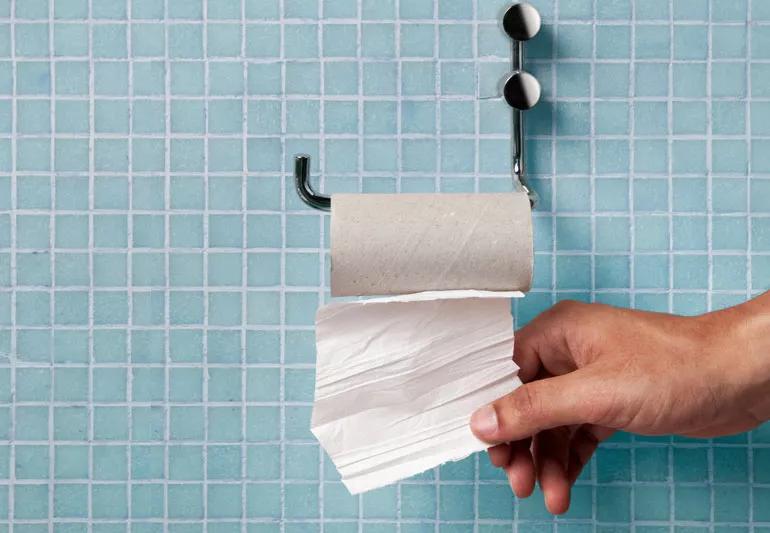5 tips to keep your bowels healthy

Image content: This image is available to view online.
View image online (https://assets.clevelandclinic.org/transform/c1cf3249-7653-45fc-b03a-5d19d5db42f4/poopingToiletPaper-175438894-770x553_jpg)
Hand in bathroom grabbing last of toilet paper
When it comes to our bowels — and their movements — we may not give them much thought. Of course, when things are not going well, we notice.
Advertisement
Cleveland Clinic is a non-profit academic medical center. Advertising on our site helps support our mission. We do not endorse non-Cleveland Clinic products or services. Policy
However, bowel movements don’t just tell us about the health of our digestive system. This may sound strange, but signs of everything from diseases to stress may show up in your bathroom habits. The key is knowing what to look for — and what the signs may mean.
Here, colorectal surgeon Sarah Vogler, MD, offers five tips for healthy bowels:
The first thing most people worry about when they have minor rectal bleeding is that they have a cancer. Of course, colon cancer is also a concern. But, Dr. Vogler says, it’s the cause of rectal bleeding only 1 to 2% of the time.
Two problems are usually responsible for blood on the paper, on the stool or in the toilet: hemorrhoids and anal fissures. The good news is that both problems are usually easy to fix.
A lot of people assume they have hemorrhoids. May their bottoms itch and they feel extra skin down there as they wipe. Must be hemorrhoids, right?
So they treat themselves with medicated wipes or cream. And yet the “hemorrhoids” don’t go away — they itch even more.
Often, the problem is, ironically, being too clean. “What happens is a circular process,” Dr. Vogler says. “Filled with good intentions, you try to keep yourself scrupulously clean by using flushable wipes. But the unexpected result is that this leads to itching and the feeling that you have hemorrhoids.”
Advertisement
Think of your time in the bathroom as a necessity, not an extended escape. If your toilet has stacks of magazines or books on the water tank, Dr. Vogler says you should consider moving them to another room.
Why? “The more time you spend on the toilet, the more likely you will strain for bowel movements,” Dr. Vogler says. “Also, the seated position puts extra stress on your anal blood vessels. Both of these factors boost your risk of hemorrhoids.”
Everyone responds differently to fiber intake. In most people, daily fiber intake helps to keep stools soft and bowel habits regular. Raw fruits and vegetables are a great source of fiber.
However, Dr. Vogler says, some people actually notice worsening of their bowel symptoms when eating foods that are high in fiber. “If you are someone that notices abdominal bloating, gas pain or more difficulty in passing stools when eating fiber, then you should consider only eating small portion of fiber,” she says. Over-the-counter stools softeners can be taken daily to help regulate bowel habits if fiber doesn’t work well.
Each person’s needs are different, too, so you have to find what works best for your body.
The biggest danger with a short bout of diarrhea is dehydration, or the loss of water and nutrients from the body’s tissues. You could become dehydrated if you have diarrhea more than three times a day and are not drinking enough fluids, Dr. Vogler says. Dehydration can cause serious complications if it is not treated.
The best way to guard against dehydration is to drink liquids that contain both salt and sugar.
Advertisement

Sign up for our Health Essentials emails for expert guidance on nutrition, fitness, sleep, skin care and more.
Learn more about our editorial process.
Advertisement
There’s usually a simple answer, like what you ate, but the color can also be a cause for concern
Excess mucus, ulcers, a high-fat diet and pancreatic conditions can make stool sticky
Diet offers a rainbow of possibilities when it comes to the hue of your stool
If it’s brown, yellow or green, there’s typically no need to worry, but call your pediatrician if your little one’s stool is red, black or white
Everyone poops, but here’s what may affect how often you visit the toilet
Your #2 can be the #1 sign of a medical issue
The short answer from a registered dietitian
The caffeine and natural acids in coffee may trigger acid reflux, but there are ways to lessen the effects
Prioritize your health by managing stress, strengthening your social connections and getting quality sleep
Bolsters, blankets, pillows and blocks can offer extra support, stability and comfort
Allergies, postnasal drip, asthma or reflux could be to blame for a cough that won’t quit